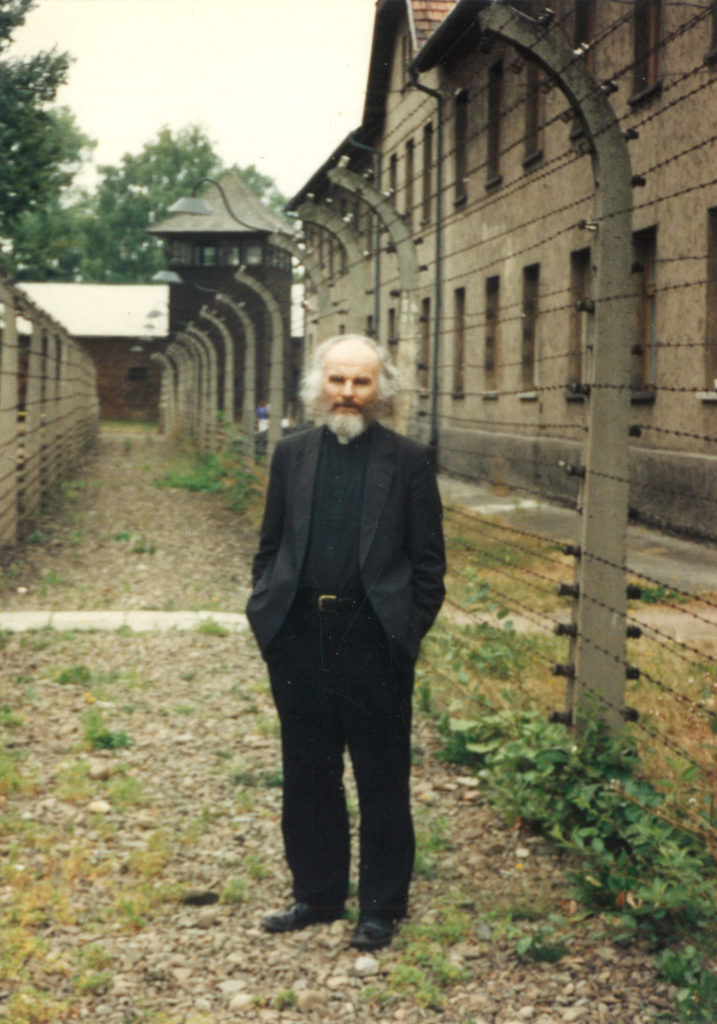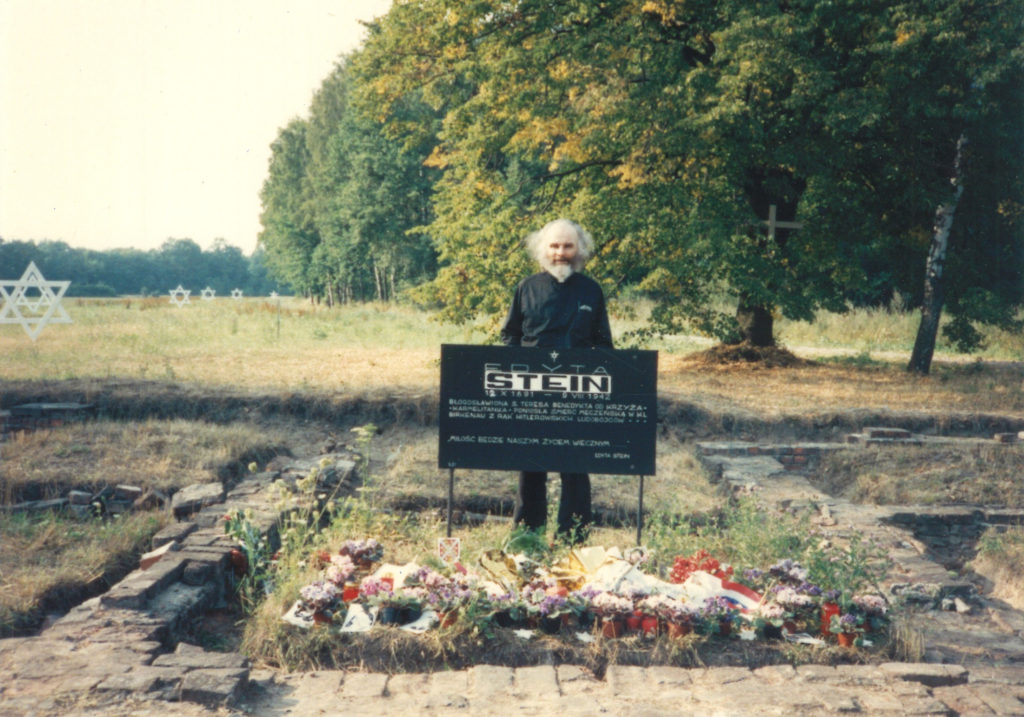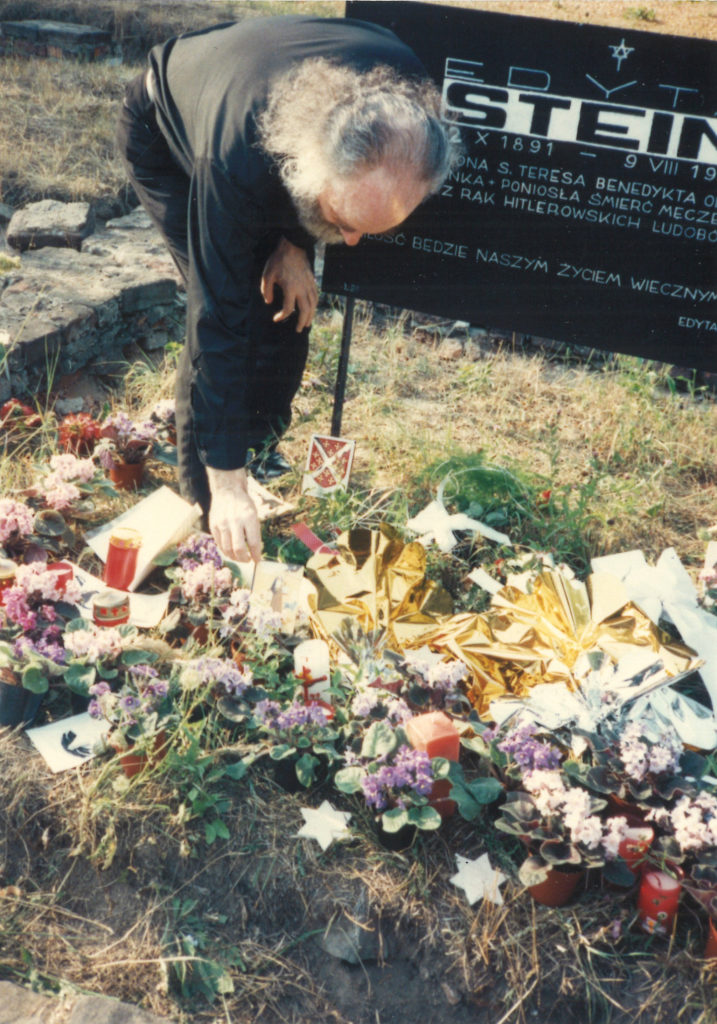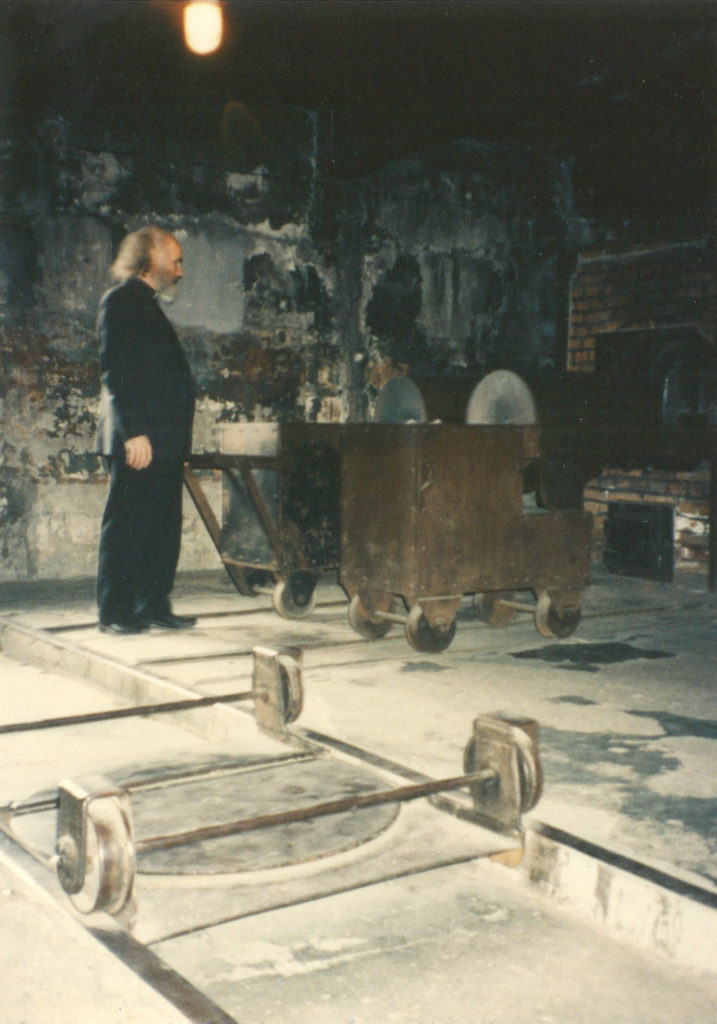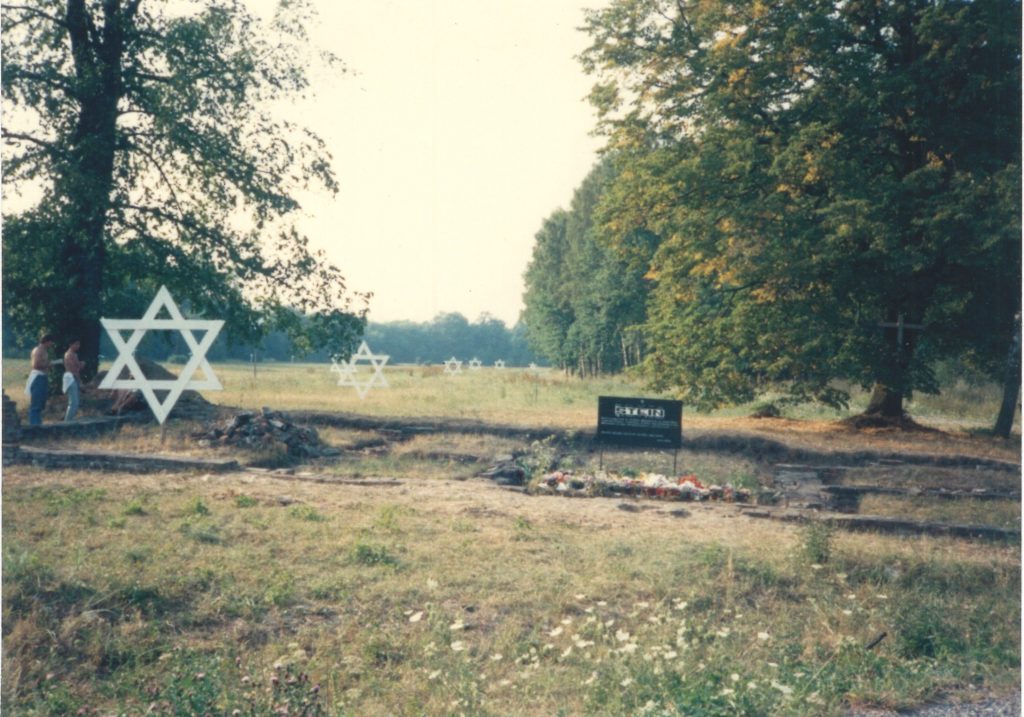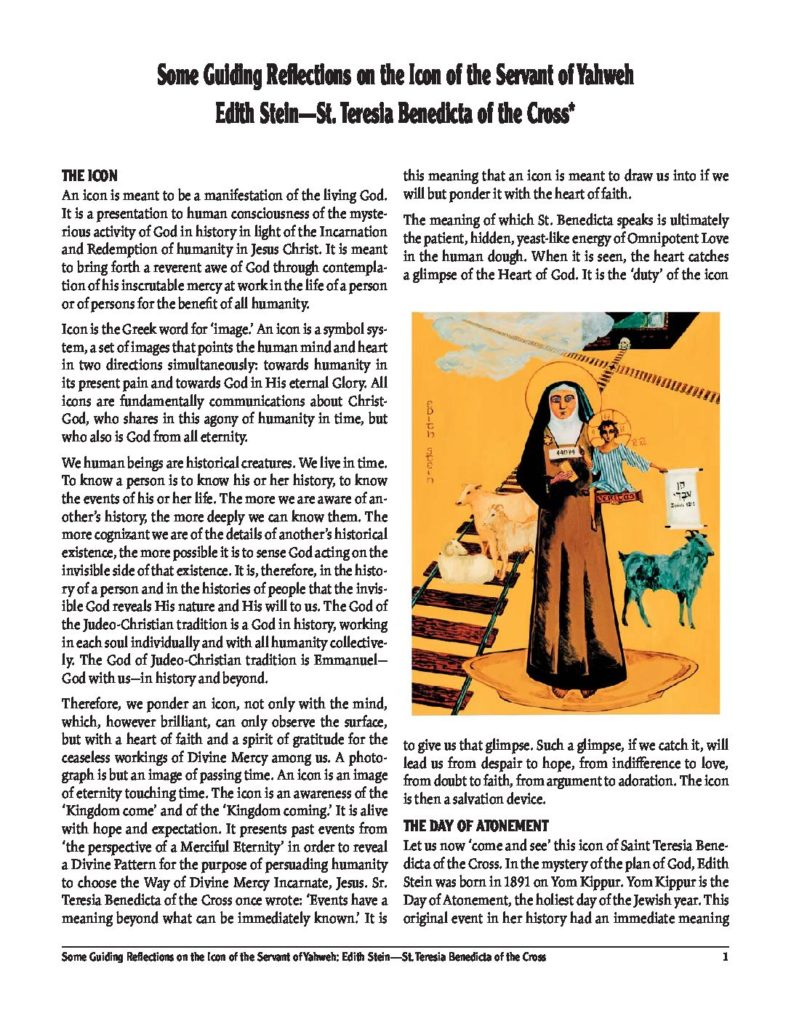Category Archives: Podcast
Men and Militarism
No comment yet because I haven’t had time to listen, but I plan to.
Army Recruiters Infiltrate Gaming
A friend of CAM in Denmark
I was honored to be interviewed this week about CAM by Jacob Munck, a Danish man who considers himself a fellow “Catholic against militarism.” I wish I’d had time to ask him questions about Poland, the EU, and Greenland, not to mention his saintly mother. Maybe next time he can be on my show!
Human Experimentation
“I can hire half the working class to kill the other half.” Jay Gould
“Half the scientists in the world, Christian or otherwise, can be hired to kill the other half.” ECM
“All our talks about peace and the weapons of the spirit are meaningless unless we try in every way to not work in any position, any job, that contributes to war, not to take any job whose pay comes from fear or war. We wish the workers would lay down their tools and refuse to make the instruments of death. One can withdraw from the factory, refuse to make munitions, airplanes, atom bombs As you come to know the seriousness of our situation—the war, the racism, the poverty in the world—you come to realize it is not going to be changed just by words or demonstrations. It’s a question of risking your life somewhere other than on the battlefields of war. It’s a question of living your life in drastically different ways.” Dorothy Day
“Am I my brother’s keeper? Oh no! I am my brother’s killer! It is a wonder that anyone employed in the making of these munitions, from the president of the company to the scientists down to the man who sweeps up at night, can look at their faces in the mirror or go to church on Sundays. Do we want to preach the Gospel of Christ or our own gospel? Which shall it be?” —Catherine de Heck Doherty, The Gospel Without Compromise, 1976
“We’re not made by God to mass kill one another, and that’s backed up by the Gospels. Lying and war are always associated. Pay attention to war-makers when they try to defend their current actions; if they’re moving their lips they’re lying.” – Phil Berrigan
“Why would anyone believe that those who would lie to them about war would not lie to them about anything else that it served their interests to lie about?” -Emmanuel Charles McCarthy
Irish Radio Interview
National Irish Radio interview with Fr. Emmanuel Charles McCarthy, 1995.
Clerical Conversations
Here’s a podcast I just found in which Cardinal Dolan is interviewed about “Militarism, the Military Culture, and Catholicism.” Produced by True Restoration. I haven’t listened to it yet, but it sure looks good!
Omnicidal Tendencies
Jeremy Scahill interviews Liz McAlister, one of the Kings Bay Plowshares 7 and wife of the late Phil Berrigan, on The Intercept podcast titled “Omnicidal Tendencies.” You can listen here: https://theintercept.com/2019/10/23/omnicidal-tendencies-the-nuclear-presidency-of-donald-trump/
On a whim, I Googled Jeremy Scahill, whom I’ve admired for years, and it turns out he was raised by two Catholic activists and spent a year living at Jonah House, founded by Phil and Liz. Here is some more information on that:
“The Blackwater scandal of American (and other) mercenaries in Iraq and elsewhere popped up on my radar as yet another dark chapter in this national nightmare surrounding Iraq. Yet I didn’t explore it as much as I would have liked (or should have) until channel-surfing the other night I came across a Bill Moyers’ interview with Jeremy Scahill, author of an impressive book of investigative reporting on Blackwater. The interview and parsing of the media counter-attack by Blackwater CEO Erik Prince was illuminating, and chilling. And Scahill’s dedication, work and presentation were beyond impressive, to me.
Catholic antipodes
I was not aware, however, that Scahill and Prince are both Catholic, until last night I read an Oct 12 profile of Scahill in NCR. Scahill was raised in a Catholic Worker home, and went to live at Jonah House with the Berrigans in Baltimore for a year in the 1990’s.
It had a profound impact on me, he told NCR. I think that being alive in the times that we live in means to be a resister…For me, media is a nonviolent weapon in that struggle.”
By David Gibson
October 21, 2007
Commonweal
https://www.commonwealmagazine.org/catholic-antipodes
First Day of Trial
Outside the courthouse for the first day of the trial of the Kings Bay Plowshares activists. We interviewed three of them on the podcast back in August: Martha Hennessy, Carmen Trotta and Clare Grady.
Below are some speeches they gave last night at the eve of the trial. Both of these videos have been taken from the Kings Bay Plowshares Facebook page and were posted by Steve Dear.
The Miracle of Edith Stein
Today’s podcast is about St. Edith Stein and the miracle that led to her canonization on Oct. 11, 1998. That miracle happened back in 1987 to the daughter of our frequent guest on the podcast, Fr. Emmanuel Charles McCarthy. Twenty-one years ago today, Fr. McCarthy con-celebrated the canonization Mass of Edith Stein in Rome with Pope Saint John Paul II (pictured below). I am excited to share this story of a miracle, which is always a story of hope. Moreover, my wish is that this story has the same affect on you that it did on me: It prompted me to take another look at Fr. McCarthy’s life and his life’s work, and to take more seriously that message of nonviolent love of friends and enemies which he has spent his life trying to communicate to the Church.

In an interview with EWTN about her book Edith Stein: A Spiritual Portrait, author Diane Marie Tartlet says: “[Edith Stein’s] whole life was an adventure and she realized that our life of the faith is not boring. If we really have surrendered ourself to God, every day becomes one of surprises, one where we are realizing God’s presence in others in our lives in various situations. There are no coincidences.“
The story of the miracle of Edith Stein illustrates in a vivid and compelling way these truths about “the life of the faith,” specifically the life of faith of Emmanuel McCarthy. Listen to the podcast today and you will understand that the story of the miracle of Edith Stein begins years if not decades before the medical anomaly of 1987. You will walk away believing that, indeed, “there are no coincidences.” The connection between Fr. McCarthy and Edith Stein was no doubt planned, encouraged, and inspired by God, and what happened to two-year-old Theresa Benedicta McCarthy in March of 1987 was nothing less than a kind of pinnacle in, or culmination of, the life of the faith that her father had lived: The miracle seems to have been linked with Fr. McCarthy’s ability to see God at work in certain situations, and his willingness to live a life that, like Stein’s, went deep into his faith, entailing sacrifice, surrender, and surprise.

Unfortunately, in the interview with EWTN, there is no mention of the miracle that made Theresa Benedicta of the Cross, Saint Theresa Benedicta of the Cross. And perhaps at first glance, that is not surprising: Ms. Tartlet wrote a book about what Edith Stein did when she was on Earth. Maybe she didn’t have the time in the interview to discuss what she did from heaven. Maybe she didn’t know.
But similarly, in this lecture on Edith Stein given by Father Barron, now a Bishop in the American Catholic Church, there is no mention of the young American girl whose miraculous healing led to Edith Stein’s canonization. And maybe at first glance, that’s no surprise either. It is only a ten-minute video after all.
Now in this lecture about Edith Stein given at Boston College, the lecturer does mention (in an aside) that some of in the audience might have heard of the young girl, Benedicta McCarthy, who was miraculously healed through the intercession of Edith Stein, and that she interestingly enough lived right there in Boston at the time; but he does not mention the fact that her father was a Catholic priest, also born and raised in Boston, who had given his life to preaching and teaching the ways of peace, just as Edith Stein had said she wanted to give her life for peace. He had even been nominated for a Nobel Peace Prize. You would think that background to the miracle might be, well, something of note.
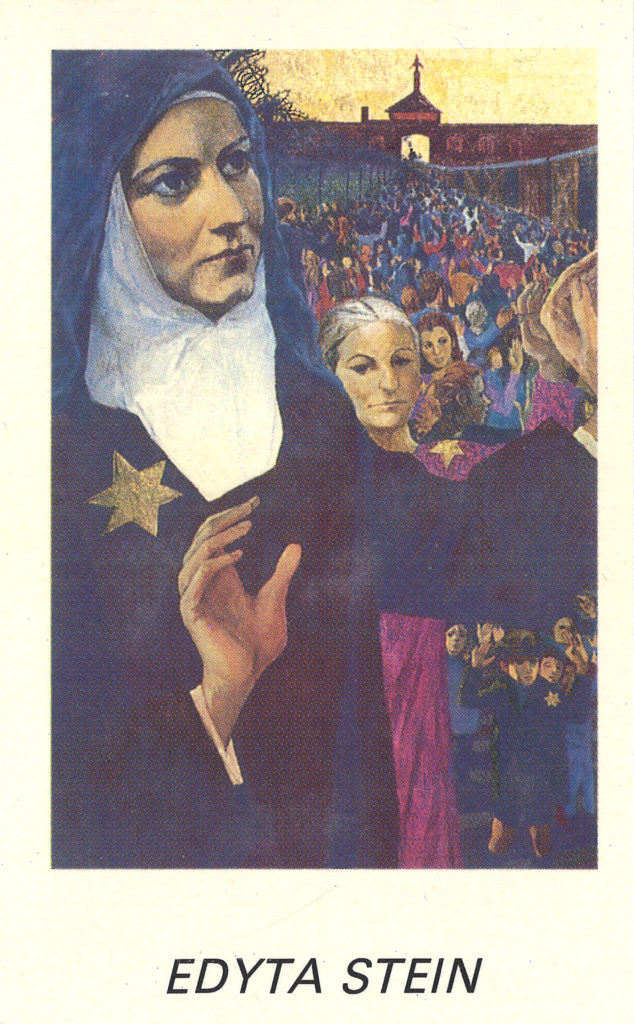
If you have been listening to the podcast since we started publishing it back in May, you know that we frequently talk about Gospel Nonviolence with Fr. McCarthy, and the fact that this message — the message of Jesus’ nonviolent love of friends and enemies, which Jesus preached by word and by deed — seems unwelcome in the institutional Church. Many times on the podcast we have discussed the strange ways (which become obvious once you have “eyes to see”) that the institutional Church de-emphasizes, minimizes, or cuts out this message of nonviolent love entirely, leaving most Catholics ignorant of it, if not outright hostile to it.
Seen in this light, the act of omission of the background of the miracle of Edith Stein, and its connection with Fr. McCarthy, an American priest, by those Catholics who want to talk about Edith Stein seems to me — how shall I say? — not entirely coincidental or accidental. Can you imagine if the canonization of a saint resulted from the miraculous healing of the daughter of, say, the founder of 40 Days for Life? Do you think anyone on EWTN, when talking about that saint, would fail to mention that miracle?
In the podcast, Fr. McCarthy tells the story of when EWTN flat-out rejected the video below when he sent it to them years ago, because, they said explicitly, their channel only airs “Catholic content.” The video below is a conversation between a Catholic priest in good standing with the Church (Fr. McCarthy), another Catholic priest in good standing who was the Catholic Chaplain to the bomb crews who dropped the bombs on Hiroshima and Nagasaki (Fr. George Zabelka), and Mairead Corrigan Maguire, a 1976 Nobel Peace Prize recipient — a pretty stellar line-up! The description is as follows: “Coming from different backgrounds and witnessing injustice and violence first hand, each participant describes how they were converted to Gospel Nonviolence. They also discuss the urgent need for the Christian Churches, Catholic, Protestant, and Orthodox, to return to Jesus’ teaching of nonviolent love of friend and enemy.”
According to EWTN, this is “not Catholic.”
In my opinion, this is “a problem.”
Part of the story of the miraculous healing of Fr. McCarthy’s daughter Benedicta through the intercession of Edith Stein (Saint Theresa Benedicta of the Cross) must include the ways in which the Catholic media has chosen not to explore this side of the miracle: the fact that it happened to the daughter of a Catholic priest who has been more or less ostracized by the institutional Church for teaching Christian nonviolence — for decades — and the ways in which that Church fails to educate people about this aspect of the Catholic faith.
As a result, we did not have enough time in the podcast to talk about Edith Stein herself to the extent that I wanted to, though we did talk about her life a bit. In the end though, there are many resources, books, websites, videos, for learning more about the holy person of St. Edith Stein, her radiant intellect, her painful conversion (in the sense that it upset her mother), her empathetic heart, the adventure of her life and her tragic death at the hands of Nazis. (Many if not most of those Nazis, we must not forget, considered themselves Christians, and for some reason never had eyes to see the glaring contradiction between following the Prince of Peace and supporting the atrocities of the Third Reich, either by their words, their deeds, or their silence. Must we not ask ourselves if Edith Stein’s martyrdom was not one result, of similar millions, of the Catholic Church’s failure to preach Jesus’s message of nonviolent love of friends and enemies for 1,700 years?). I suppose I felt I had to use the time on the podcast to try to address the strange and enduring lacuna: that part of the story of the miracle that is rarely, if ever, told, the “before” of the miracle — the decades worth of a life lived in faith which led to that moment of healing and the glorification right here on Earth of God’s omnipotence and His infinite mercy.
There is an “after” to the miracle, too, which seems to me a bit sad and disappointing. Yes, Fr. McCarthy did have the opportunity to con-celebrate the canonization Mass with Pope Saint John Paul II in 1998, but the miracle has not opened the eyes, ears and hearts of many Catholics in the way it could — in the way that it opened mine, or I should say the miracle has not been allowed to open the eyes, ears, and hearts of many Catholics in the way that it could, mainly because the Catholic press, especially in America, has been and continues to be absolutely uninterested in reporting on it, and continues to treat nonviolent love, which was the love of Edith Stein, which was the love of Jesus Christ, as merely an odd, infrequent and eccentric choice on the part of exceptional or exemplary Christians rather than as a central tenet of Jesus’s teaching, not to mention the oldest tradition and teaching on violence in the Catholic Church.
It wasn’t until I saw the ABC News Special called “It Takes a Miracle” that I began to wonder if I shouldn’t pay a bit more attention to this Father McCarthy character. It remains sad to me that I had to find out about this miracle, and its connection with this priest, through a secular media outlet, and from an old bootlegged copy of the ABC special on a CD in a dusty jacket, handed to me by a friend of Fr. McCarthy’s, rather from my own Church. At the time of this writing, the YouTube video of the ABC special only has 184 views, and the dynamite conversation (rejected by EWTN as “not Catholic”) only 277! Imagine what would happen if EWTN and National Catholic Register and other such outlets would merely allow its viewers to consider the tradition of Gospel Nonviolence in a serious and studious way!
In addition to listening to the podcast, I highly recommend watching the ABC News special (above) as well as reading the one thing Fr. McCarthy ever wrote about the miracle: “Pondering a Miracle and the Living Mystery Beyond It” (below). More resources on Edith Stein can also be found here at the Center for Christian Nonviolence.
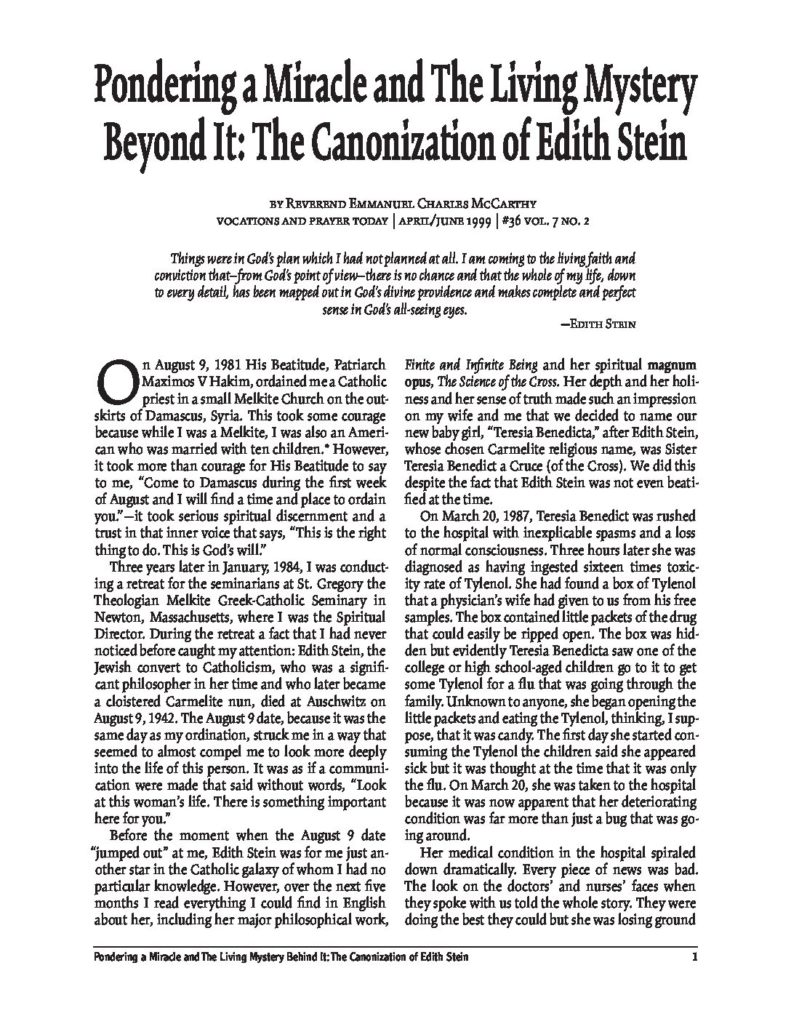
Finally, below are some photographs that Fr. McCarthy has allowed me to share with you. In her interview with EWTN, Tartlet says:
“[Edith Stein’s] whole life was an adventure and she realized that our life of the faith is not boring. If we really have surrendered ourself to God, every day becomes one of surprises, one where we are realizing God’s presence in others in our lives in various situations. There are no coincidences. She almost says it’s a pity for those who are content to live a life of superficiality. Because once you start going deep, life becomes an adventure.”
The interviewer nods and responds: “But many people are afraid to go deep because they are afraid of what their adventure might be.”
One wonders if, by omitting, minimizing, or flat-out rejecting Jesus’ teaching of nonviolent love of friends and enemies, EWTN and other mainstream Catholic media outlets are themselves spreading a “superficial” Christianity because they are “afraid to go deep,” and afraid of what that adventure might be.
Saint Theresa Benedicta of the Cross, pray for us! Pray that we can follow your example in ceaselessly seeking the truth, that we never be satisfied with anything less than the truth, and that the Christian Churches will return to Jesus’ teaching of nonviolent love of friends and enemies, and thereby find the true peace of Christ, and bring that peace to the world.
